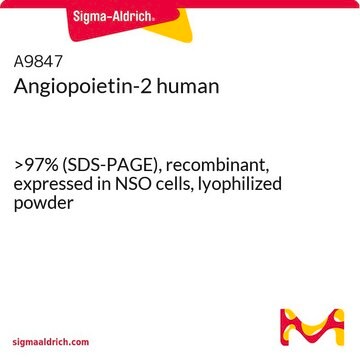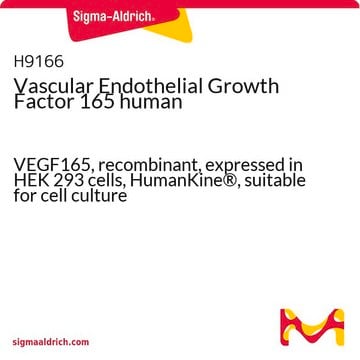GF165
ANG-2 Protein, Human Recombinant
Angiopoietin2 (Ang-2) is a secreted glycoprotein that plays a complex role in angiogenesis & inflammation.
Sinônimo(s):
ANG2, ANG, Angiopoietin 2, ANGPT2
Faça loginpara ver os preços organizacionais e de contrato
About This Item
Código UNSPSC:
12352202
eCl@ss:
32160405
NACRES:
NA.77
Produtos recomendados
Descrição geral
Angiopoietin2 (Ang-2) is a secreted glycoprotein that plays a complex role in angiogenesis and inflammation. Ang-2 is widely expressed during development, but it is restricted postnatally to highly angiogenic tissues such as the placenta, ovaries, and uterus. It is particularly abundant in vascular endothelial cells (EC) where it is stored in intracellular Weibel Palade bodies. ANG-2 binds to the endothelial cell specific receptor Tie2, but, in contrast to ANG-1 does not induce tyrosine phosphorylation. Consequently, ANG-2 modulates ANG-1 activation of Tie2 and, depending on the physiological and biochemical environment, can act either as a n agonist or antagonist of Tie2 induced angiogenesis. Physiologically, ANG-1 and ANG-2 are associated with sprouting, tube formation, and structural integrity of newly formed blood vessels. Mature human ANG-2 is a secreted protein containing 480 amino acid residues. ANG-2 is composed of an α helix rich “coiled coil” N-terminal domain and fibrinogen like C-terminal domain. ANG-2 exists predominantly in the form of a disulfide-linked dimer. Recombinant human ANG-2 is a C-terminal histidine tagged glycoprotein which migrates with an apparent molecular mass of 60.0 – 70.0 kDa by SDS-PAGE under reducing conditions. Sequencing analysis shows an N-terminal sequence starting with residue 68 (D) of the ANG-2 precursor protein.
Product Source: CHO Cells
Especificidade
Cross Reactivty
None
None
Aplicação
Research Category
Stem Cell Research
Stem Cell Research
Research Sub Category
Growth Factors & Receptors
Growth Factors & Receptors
Qualidade
Bioactivity assay: Determined by the dose-dependent stimulation of the proliferation of human umbilical vein endothelial cells (HUVEC). Bioactivity assay: Determined by its ability to stimulate tubulogenesis in HUVEC cells using a concentration of 0.2μg/ml.
forma física
Product is filtered through a 0.2 micron filter before lyophilization.
Armazenamento e estabilidade
Store at -20°C for up to 6 months from date of receipt.
Exoneração de responsabilidade
Unless otherwise stated in our catalog or other company documentation accompanying the product(s), our products are intended for research use only and are not to be used for any other purpose, which includes but is not limited to, unauthorized commercial uses, in vitro diagnostic uses, ex vivo or in vivo therapeutic uses or any type of consumption or application to humans or animals.
Código de classe de armazenamento
11 - Combustible Solids
Classe de risco de água (WGK)
WGK 1
Certificados de análise (COA)
Busque Certificados de análise (COA) digitando o Número do Lote do produto. Os números de lote e remessa podem ser encontrados no rótulo de um produto após a palavra “Lot” ou “Batch”.
Já possui este produto?
Encontre a documentação dos produtos que você adquiriu recentemente na biblioteca de documentos.
Shihui Xu et al.
EBioMedicine, 86, 104312-104312 (2022-11-07)
The role of the IL6 family members in organ fibrosis, including renal interstitial fibrosis (TIF), has been widely explored. However, few studies have ever simultaneously examined them in the same cohort of patients. Besides, the role of leukemia inhibitory factor
Nossa equipe de cientistas tem experiência em todas as áreas de pesquisa, incluindo Life Sciences, ciência de materiais, síntese química, cromatografia, química analítica e muitas outras.
Entre em contato com a assistência técnica





